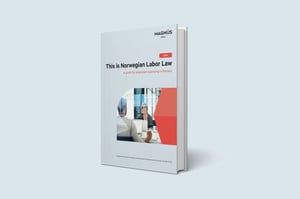
A NORWEGIAN LABOR LAW GUIDE FOR EMPLOYERS IN NORWAY
What foreign companies must know about employing in Norway
Norway is an attractive destination for foreign investors and companies looking to expand. However, many are surprised by the strong protections in place for employees and the significant responsibilities employers must uphold when doing business in Norway.
Norwegian labor law regulations, also known as the Working Environment Act, is strict, and non-compliance can lead to severe financial penalties and other legal consequences. Ensuring compliance from the start is essential to avoiding costly mistakes.
To help you navigate these regulations, we’ve created this online guide that provides a general overview of your obligations as an employer in Norway, from hiring to termination of employment.
However, the Norwegian Environment Act evolves frequently, and different regulations apply depending on factors such as your industry, company structure, employee locations, and more. Therefore, before establishing your business in Norway and hiring employees, we strongly recommend seeking professional advice to stay up to date and ensure full compliance.
Also read: What are the legal responsibilities for employees in Norway?
Key resources you should download

Adhering to Norwegian Labor Law is key when doing business in Norway. Download guide to get a complete and detailed overview.
Understanding Norwegian compliance is key when doing business in Norway. This comprehensive guide provides a complete overview of everything you need to know and adhere to.
When selling goods or services in Norway, you must comply with Norwegian VAT regulations. This practical guide explains everything you need to know about VAT in Norway.
Norwegian compliance is complex and varies by country. Check out our country-specific Doing Business in Norway guide and download the version for your region
Ways to offer employment in Norway
During hiring, it is crucial to understand the correct way to offer employment in Norway from the start.
There are three main ways to employ workers in Norway:
- Direct Employment – Your employees work directly for your company as part of your regular business operations.
- Independent Contracting – You provide a complete service package to a client, including workers, equipment, management, and responsibility for the results. This is typically used for specific, limited projects.
- Staffing Company – You supply workers to a client, but the client is responsible for project outcomes and necessary equipment.
Also read: Employees vs. Subcontractors: The importance of proper classification.
Hiring regulations for using staffing companies in Norway
In Norway, hiring through staffing companies is only allowed under specific circumstances. Additionally, in the broader Oslo region (Oslo, Akershus, Østfold, and Vestfold), construction companies are prohibited from using staffing agencies.
Outside this region, staffing companies can be used in the following cases:
- Temporary replacement – Filling in for an employee on leave (e.g., maternity leave).
- Healthcare staffing – Temporary hiring of healthcare personnel to maintain essential health and care services.
- Specialized expertise – Engaging advisers or consultants with unique knowledge and skills.
Hiring regulations for independent contractors and from regular businesses
In Norway, hiring from businesses that are not primarily staffing agencies is permitted under specific conditions:
-
The hired employee has a permanent position with the lessor.
-
The work falls within the same professional domain as the hiring company.
-
The hired workforce does not exceed 50% of the hiring company's permanent staff.
-
Employee representatives are consulted before hiring.
Hiring foreign workers, these are the rules
When employing foreign workers in Norway, you must make sure they have a valid work permit.
The requirements depends on the individual's country of origin.
Also note that regardless of origin, all foreign nationals planning to work on the Norwegian mainland must undergo and ID check upon arrival to verify the person's identity.
Here are the rules for foreign workers in Norway:
-
Nordic citizens (from Sweden, Denmark, Iceland, and Finland) can work in Norway without registering with the police.
-
EU/EEA citizens must register with the police within three months of arriving. If staying more than six months, they must report their move within eight days of arrival.
-
Non-EU/EEA citizens need a residence permit to work in Norway.

Permanent or temporary employment?
When employing workers in Norway, you must choose between permanent or temporary employment.
- Permanent employment is the standard practice in Norway, where an employment contract runs indefinitely.
- Temporary employment can be used for defined periods, but must fall under one of the following categories:
Also read: The rules for temporary employment in Norway
- Tasks of a temporary nature
- Acting as a temporary substitute for someone (maternity leave, extended sick leave or similar)
- Positions designed for trainees
- Roles associated with labor marked schemes supervised by, or in partnership with, the Labor and Welfare service
- Jobs for athletes, trainers, referees, and other leadership roles within organized sports
The employer's obligations for employment contracts in Norway
When hiring workers in Norway, you must provide a written employment contract that meets the Norwegian legal requirements. Failing to comply can be costly and lead to disputes.
We recommend investing time and resources in well-prepared contracts tailored to your company’s needs and specific roles.
Also, while you are free to select your employees, Norwegian labor law defines specific criteria's where discrimination is prohibited.
Also read: Key considerations for drafting Norwegian employment contracts
Norwegian working hour regulations
In Norway, working hours is defined as the time when the employee makes themselves available to the employer. The employer and employee must agree to these hours, explicitly stated in the employment contract.
Also read: The rules for working hours and overtime in Norway
It’s important to note that working hour regulations in Norway are strict. However, you can arrange for an average calculation of working hours through an individual agreement, collective agreements, or approval from the Norwegian Labor Inspection Authority, as long as you meet the required conditions.
Also read: How to arrange working hours with a fixed average
There are two types of working hours:
-
Ordinary working hours are regular hours, usually limited to 40 hours per week or 9 hours within a 24-hour period.
-
Irregular working hours include unconventional schedules, such as round-the-clock shifts, Sunday and holiday work, and night shifts. These are capped at 9 hours in a 24-hour period and 38 hours per week. For employees working underground or on continuous shift patterns, the limit is reduced to 36 hours per week.
- 01 OVERTIME
- 02 SUNDAY WORK
- 03 NIGHTTIME WORK
What classify as overtime in Norway?
What are the rules for working on Sundays in Norway?
What are the rules for working nighttime in Norway?
What are the rules for minimum wage in Norway?
In Norway, there is no national minimum wage. However, minimum wage rates are set through collective agreements for specific industries and sectors. These agreements ensure that workers are paid fairly based on their job roles, experience, and the sector they work in. Employers must adhere to the terms of these agreements to ensure workers receive appropriate compensation for their work. These rates are subject to negotiations each year.
Minimum wage practices in Norway are commonly applied in the following industries:
- Construction
- Cleaning
- Accommodation and catering
- Ship and shipyard
- Agriculture and horticulture
- Fishing
- Electricity
- Goods transport by road
- Passenger transport by bus or touring card
Holiday and holiday pay regulations in Norway
In Norway, employees who start their job by September 30 of the holiday year are entitled to 4 weeks and 1 day (25 working days) of vacation the following year. However, some employers have collective agreements that specify 5 weeks of holiday.
Those who start after September 30 are entitled to 6 working days of vacation the next year.
If an employee has not accrued holiday pay from the previous year, they can choose to skip their holiday for that year. However, if they are entitled to holiday pay, the employer must ensure they take their holiday.
Holiday pay in Norway includes several compensation related to an employee’s earnings, such as regular salary, overtime, and other payments. It is usually paid in June, replacing the regular wage for salaried employees, while hourly-paid workers receive both their hourly wage and holiday pay.
Holiday pay is calculated based on the employee's earnings from the previous year. The minimum rate is 10.2% for those entitled to 4 weeks of vacation and 12% for those entitled to 5 weeks.
Salary on public holidays in Norway
In Norway, employees who work on public holidays are generally entitled to extra compensation. Many collective agreements specify a 100% pay increase (double pay) for work on public holidays, though exact rates may vary by industry and employer agreements.
Employees with monthly salaries receive their regular pay on public holidays, even if they do not work.
Hourly paid employees who were scheduled to work but do not due to a public holiday are still entitled to pay for that day.
Also read: Salary on public holidays in Norway
Sick pay regulations in Norway
In Norway, when an employee falls ill, the employer is responsible for covering their salary for the first 16 days. If the illness lasts longer, the Norwegian Labour and Welfare Administration (NAV) usually takes over sick pay coverage.
However, employees holding an A1 certificate are an exception to this rule. They are not covered by the Norwegian Social Security System and are therefore not entitled to sick pay under Norwegian law. Instead, they receive sick pay according to the regulations of their home country.
Also read: Sick pay regulations for employers in Norway
To qualify for sick pay in Norway, the following conditions must be met:
- The employee must be genuinely sick or injured.
- They must be a member of the Norwegian Social Security System (mandatory for residents of Norway).
- They must have worked for the same employer for at least the four weeks leading up to the illness.
- The illness must result in a clear loss of income.
- The employer must be notified of the employee's sickness or injury.

Employers obligations for occupational injury insurance
In Norway, employers are legally required to provide occupational injury insurance for their employees. This insurance covers work-related injuries and illnesses, ensuring compensation for medical expenses, lost income, and potential disability benefits. The coverage must comply with the Occupational Injury Insurance Act and applies to all employees, regardless of job type or contract length. Employers must arrange this insurance through an approved provider, and failure to do so can result in fines and liability for compensation costs.
The employer's National Insurance contribution
Norwegian employers are required to pay National Insurance contributions (arbeidsgiveravgift) on employee salaries and benefits. The contribution rate varies by municipality, typically ranging from 0% to 14.1%, depending on the employer’s location. These payments help fund Norway’s social security system, covering pensions, healthcare, and other welfare benefits.
Employers must calculate and report these contributions through the A-melding (A-report) each month, with payments due by the 15th of the following month. Failure to comply may result in penalties and interest charges.
Also read: Employer's National Insurance contribution in Norway
Obligatory Occupational Pension Scheme
In Norway, all employers are required to set up a mandatory occupational pension scheme, known as “OTP” (Obligatorisk Tjenestepensjon), for employees who are part of the Norwegian Social Security System. As an employer, you must contribute at least 2% of each employee’s salary annually, up to a maximum of NOK 1,488,336 (as of January 2025).
An employer must set up a pension scheme if they meet at least one of the following criteria:
- The enterprise employs at least two individuals whose work hours and salary are 75% or more of a full-time
position. - The enterprise has a single employee without ownership stakes in the business, whose work and salary
equate to a full-time equivalent (FTE) of 75% or more. - The enterprise has multiple employees, each working hours and earning salaries equivalent to at least 20% of a full-time position. Combined, their efforts equate to at least two full-time positions.
Employee's tax card
Employers must deduct taxes from employee salaries based on the tax card information provided by the Norwegian Tax Administration. The withholding tax rate varies between 17.1% and 50%, depending on the tax card details. Employers can access employees' tax cards through Altinn.
If an employee does not complete the required ID check, they will not receive a tax card. In such cases, employers must withhold tax at the maximum rate of 50%.
When submitting withholding tax payments, employers should total the reported amounts from the A-melding (A-report) covering the relevant two-month period. After electronic submission, a KID number will be provided for payment. Withholding tax payments must be sent to the Norwegian Tax Administration.
Norwegian HSE card regulations
In Norway, all workers in the construction, building, and cleaning industries—both Norwegian and foreign—must have a valid HSE (Health, Safety, and Environment) card. This identity card contains details about the employee and their employer.
Employers are responsible for ensuring that all workers who require an HSE card have a valid one throughout their employment. Employees cannot start work until they either have a valid HSE card or can provide proof that an application has been submitted.
Also read: What is an HSE card?
What is A-report and why must employers submit them?
In Norway, employers are required to submit an A-melding (A-report) each month to the Norwegian Tax Administration. This report includes details about employees' salaries, tax deductions, social security contributions, and employment status. The deadline for submission is the 5th of each month, covering the previous month's payroll. Accurate and timely reporting is essential to ensure compliance with tax and social security regulations.
Failure to submit or incorrect reporting can result in penalties. The A-melding system simplifies reporting by consolidating multiple obligations into a single digital submission.
Also read: What you need to know abut the Norwegian A-report

Employer obligations for a safe working environment in Norway
Employers in Norway must ensure a safe and healthy working environment (HSE) by addressing both physical and psychological risks. Work tasks should be organized to prevent injuries and illnesses, and employees must receive proper training and be involved in safety planning. Employers must also protect workers from harassment, violence, and unsafe conditions, ensuring workplaces meet health and safety standards.
- 01 HEALTH SERVICE
- 02 SAFETY REPRESENTATIVE
- 03 AMU
- 04 INFORM & CONSULT
- 05 WHISTLEBLOWING
Occupational Health Service obligation
If required by authorities or the nature of their work, employers must partner with an Occupational Health Service approved by the Norwegian Labour Inspection Authorities. This is especially important in high-risk industries like construction, healthcare, transportation, and manufacturing. The Occupational Health Service helps employers, employees, and safety representatives create a safe workplace and promote good occupational health.
Health and safety representative obligation
In Norway, all employers must appoint a Health and Safety Representative (Verneombud), chosen by employees. If a company has fewer than five employees, an alternative arrangement, such as not having a representative, can be agreed upon if documented. The number of representatives depends on factors like company size, work nature, and conditions.
The Health and Safety Representative plays a key role in connecting employees and employers, supporting proactive HSE initiatives, and ensuring employees' rights to influence workplace safety matters.
Also read: When is a safety representative required?
The obligation to have an working environment committee
Companies with at least 30 employees must establish a Working Environment Committee (AMU), consisting of representatives from the employer, employees, and occupational health services.
The committee's main goal is to ensure a safe and healthy work environment, actively contributing to safety measures, environmental initiatives, and monitoring employee wellbeing. Committee members must be officially announced through workplace notices.
Employers obligations to provide information and discuss
In companies with at least 50 employees, the employer must inform and discuss important matters regarding the working environment, including company activities, financial status, and staffing levels. These discussions should include employee union representatives.
If necessary, the employer can require confidentiality from union representatives and advisors, even after their term ends. In exceptional cases, the employer may withhold information if it could harm the business.
For company groups with at least 50 employees, the parent company must set up frameworks for collaboration and information sharing between the companies and their employees, in consultation with employee representatives or unions.
Obligations to establish whistleblowing routines
Norwegian labor law on termination of employment
In Norway, the termination of employment is subject to strict regulations under the Norwegian Working Environment Act, and employers must follow specific processes to ensure compliance. This includes temporary layoffs, redundancy, dismissal without notice and termination of employment for other reasons, such as business closures or employee performance issues.
It’s essential for employers to understand these regulations and follow them carefully to avoid sanctions and to ensure fair treatment of employees during the termination process.
- 01 TEMPORARY LAYOFFS
- 02 PERMANENT LAYOFFS
Employer obligations during temporary layoffs
Temporary layoffs can be implemented when faced with temporary challenges, such as a shortage of orders, accidents, or natural disasters that lead to operational reductions or shutdowns. These layoffs are meant to be short-term, and employees can be laid off without pay for up to 26 weeks within an 18-month period. Before initiating a temporary layoff, employees must receive at least 14 days' notice, unless the situation is unforeseen, in which case the notice period can be as short as two calendar days.
Employers are required to continue paying salaries for the first 15 days of the layoff, after which employees may be eligible for unemployment benefits through the Norwegian National Insurance Scheme.
Also read: Rules for temporary layoffs - What employers must know
Redundancy, dismissal, and termination of employment
If you need to make employees redundant or terminate employment due to financial issues, business restructuring, or employee-related problems, valid grounds must be established.
Employers must follow the correct procedures, as outlined in Chapter 15 of the Norwegian Working Environment Act. This includes ensuring proper documentation, adherence to notice periods, and, in certain cases, offering severance. Failure to comply with these regulations can result in significant penalties and legal consequences for the employer.
Also read: The strict rules for terminating employees

Do you need support with Norwegian labor law matters?
Magnus Legal is a full-service Norwegian law firm specializing in assisting foreign companies operating in Norway. Labor law is one of our key areas of expertise, and our team of experienced labor law attorneys provides comprehensive support to businesses on all employment matters, from hiring to termination.
If you're planning a project in Norway, we strongly recommend seeking professional advice before starting your business to ensure compliance with Norwegian labor law regulations and obligations.
Visit our Labor Law page to learn more about our services, or feel free to contact us for a chat.



